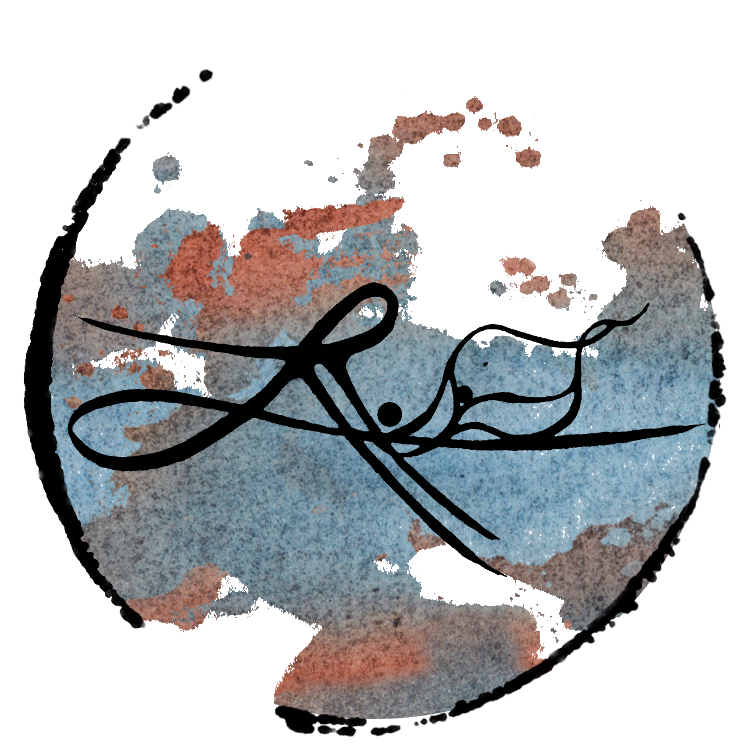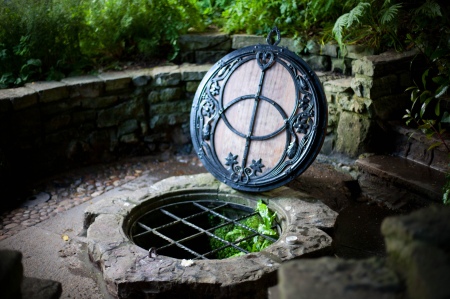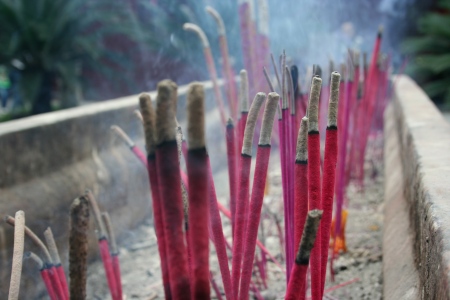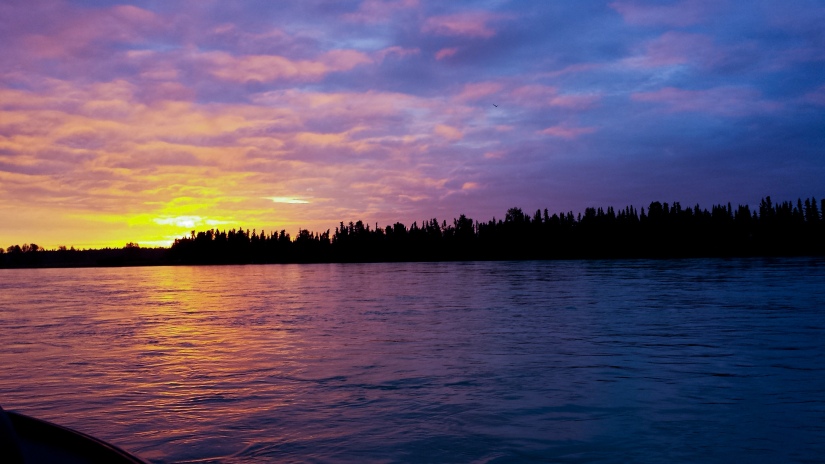In the days of the ancient Celts, a devotee might have honored the gods of her people with a votive object — a torc, a piece of intricately-wrought jewelry, a small statue of a god or goddess, a bent silver coin — given in offering to the clear-running waters of a river or wellspring, or deposited in the murky waters of a marsh at a dedicated sacred site. In the same way, a warrior might have offered up his sword or shield, ritually broken to render it useless or perhaps forged specially to be a sacrifice, never to be used in battle.
But those days are gone.![]()
Now, when I walk along the creek that runs through the city park near my house, it is the glint of discarded beer cans or the ripped foil from a cigarette carton that catches my eye, pressed into the muck of the streambed. On misty spring days, the smell of sewage is thick in the air. The water is polluted with urban runoff, the chemical waste from homes and businesses, fertilizers, pesticides and bacterial blooms, while oil slicks and other toxins leach into the surrounding soil. It has been almost one hundred years since the salmon who once overflowed the banks of this stream every autumn have been able to survive here.
These days, we are constantly confronted by the reality of how humans impact the planet. We cannot toss a piece of jewelry into the local stream without knowing that this is an act of pollution no less harmful than that of those who leave their beer cans behind. We cannot leave food or drink at an outdoor shrine without considering how it may endanger the health or safety of local wildlife. The ritual practice of “silvering the water” takes on a sinister, sickly meaning in a modern world where large-scale industrial mining for precious metals and minerals has caused serious, far-ranging environmental damage, including the release of toxic heavy metals into our already threatened waters.
As Pagans, we often have a love affair with the past that leads us to try to model the rituals and practices of ancient times as closely as possible. But we live in a different world today. Despite the ornate beauty of certain approaches to Druidic ritual, I wince if the officiating priest uses tiny single-serving bottles of whiskey or wine as an offering, pouring one for each of a half-dozen gods into an offering bowl (or worse, onto the ground). What else can we do at the end of the ritual, but dump that bowl of booze down the drain and toss all those little plastic bottles in the trash?
Can this really be what the gods want from us? Are we so busy trying to do ritual “correctly” that we fail to do it right?
This question isn’t unique to modern Pagans. In China, Taoists and Buddhists face similar challenges as they grapple with the dire problem of air pollution, and how it impacts the traditional practice of burning incense, candles, paper and fireworks as propitiatory offerings to gain favor with the gods. The founder of the Alliance of Religions and Conservation, Martin Palmer explains:
[T]hey “were getting overwhelmed by the smoke—and were really offended by the gross consumerism of this.”
So the Daoists teamed up with the Buddhists and began the “Three Sticks Movement.” When people enter temples, they are urged (or, in the case of the Ling Yin temple in Hangzhou, required) to limit their incense to three sticks: “one for heaven, one for earth, one for you.” The movement has little impact on macro-level air pollution, but the revolution is intended to be a cultural one, Palmer says.
“What’s fundamental about that movement is that it’s saying ‘simplicity.’ It is saying that extravagance, that excess, has no place in a more compassionate, more spiritual world.”
Whether the Three Sticks Movement will have a wider cultural or environmental impact remains to be seen, but already some monks have begun to notice that only a few years after adopting the practice, “the curtain of smoke around temples was removed” and the birds had begun to return.
The ancient Celts held a special reverence for water. The mists that blew in off the sea, the wellsprings that rose up out of the earth, the rivers and streams that wound their way through the land providing fresh water and swift passage, the bogs and marshes that could be treacherous obstacles to the unwary and the lost — all of these were seen as liminal thresholds, doorways to the Otherworld. It was with good reason that votive objects were so often deposited in such bodies of water, given over to the realms of the gods, the fair folk and the beloved dead.
These days, this same reverence for the element of water compels me to rethink some of the ancient rituals that I seek to embody in my modern practice. Rather than deposit offerings in local waters, which are already strained by the heavy burden of human pollution, instead I make an offering of water itself. I use a minimal amount of clean water (no oils or other additives), blessing it three times — once for the ancestors, once for the spirits of the land, and once for the gods — before I pour it in libation:
By the warmth and work of my hands,
I bless this water
As an offering to my ancestors.By the sound and song of my voice,
I bless this water
As an offering to the land.By the breath that moves me and gives me life,
I bless this water
As an offering to my gods.May this thrice-blessed water be accepted as an offering
of my love, gratitude and praise.By the Three Sacred Realms,
by Land, Sea and Sky,
so may it be.
Like the proponents of the Three Sticks Movement, I believe that this compassionate simplicity is offering enough. I look for no other silver in the water than the salmon’s annual return.
Photo Credits:
• “Glastonbury, Chalice Well,” by The Mask and Mirror (CC) [source]
• “Burning Incense,” by Richard IJzermans (CC) [source]
• “Kenai Sunrise,” by Eric (CC) [source]




You make some excellent points and it’s true that in this day and age, we should consider how our ritual offerings might impact the already beleaguered environment. Thank you!
LikeLike
Thanks for your comment, Troy. 🙂
LikeLike
Great post and I agree 100%. I’ve quit using ritual fire for the same reasons–particulate pollution, contributes to global warming etc. Yes the environmental impact of a ritual fire is pretty insignificant in the greater scheme of things, but I find I can’t light one knowing the damage it does, no matter how minute.
LikeLike
Yeah, exactly! The rituals we do are supposed to be MYTHIC — we enter sacred space and actually participate in “re-creating the cosmos” in a sense. What does it say if those rituals are harmful or polluting? Even if the actual pollution is small, it’s not the kind of thing I want to be embodying and re-affirming within my sacred space.
LikeLike
Thank you for this. In certain pagan traditions, there is a great emphasis on making “material offerings”, including throwing silver into natural water sources. I’ve even heard of someone throwing plastic CDs into the river as an “offering”. Often these sorts of people don’t see nature as the central object of devotion, and will do what they believe the gods “want” regardless of the consequences.
I, like you, believe in the fundamental importance of adapting ancient ideas to today’s world, and the need to therefore make our offerings environmentally sustainable and clean, something the earth can use or at least will not harm it.
In my own practice, I silver the water by touching it with a pendant that I then wear as a reminder of my path, and I make offerings of birdseed on my feeding table, or food and drink that I then consume as a “shared meal” instead of throwing out.
LikeLike
Ah yes… I have Definite Opinions about that claim that Paganism isn’t or shouldn’t be nature-centered. (In short, if your theology doesn’t acknowledge and embrace modern science, including ecology and environmentalism, then I am at best wary of it… and if your gods aren’t pointing you back towards the earth and saying — gently or not — “Respect this space! Clean up your shit!” then, really, what good are they? That’s stuff even gods should learn in kindergarten! 😉
“In my own practice, I silver the water by touching it with a pendant that I then wear as a reminder of my path…”
I absolutely love this idea! Simple and powerful. I’m definitely stealing it. 🙂
LikeLike
Great blog post! x
LikeLike
Great, thought-provoking post. As my own path has taken me into ever deeper relationship with the waters that surround my home, finding appropriate ways of crafting ritual has been a steep but beautiful learning curve.
In my order, we have a saying: whatever you cast into the waters will return to you, however transformed, upon the waves. And although this saying has a metaphorical truth, the very literal reality of it demands our attention. The caffeine we drink ends up affecting the shellfish on our shores; the plastic we create washes back up on our beaches and finds its way into the bellies of fish and gulls.
What I most often offer to the sea is song; taking my cue from folklore, I might include native yellow flowers or offerings woven from local meadow grasses on special occasions. But every time I offer something up into the waters, I take a moment to meditate on where it might go, and how it might return.
LikeLike
Thank you for this!!! So much love to you!!
LikeLike
Ok, now I’m wondering: what exactly *is* “The ritual practice of ‘silvering the water'”? I’ve never heard of it and Google is giving me anything but info to do with rituals.
LikeLike
“Silvering the water” is my poetic way of referring to the practice of depositing votive offerings in bodies of water such as wells, rivers, lakes, bogs, etc. It’s not a single specific ritual, but a general practice that has persisted to this day at certain Christian holy sites and has been incorporated by many modern Pagans into various kinds of rituals, although you can also see its influence in the form of secular superstitions like tossing coins into a public fountain or wishing well. The practice is well-represented in archeological finds throughout Europe. Check out, f’ex, Bradley’s archeological analysis of prehistoric hoards and votive deposits.
LikeLike